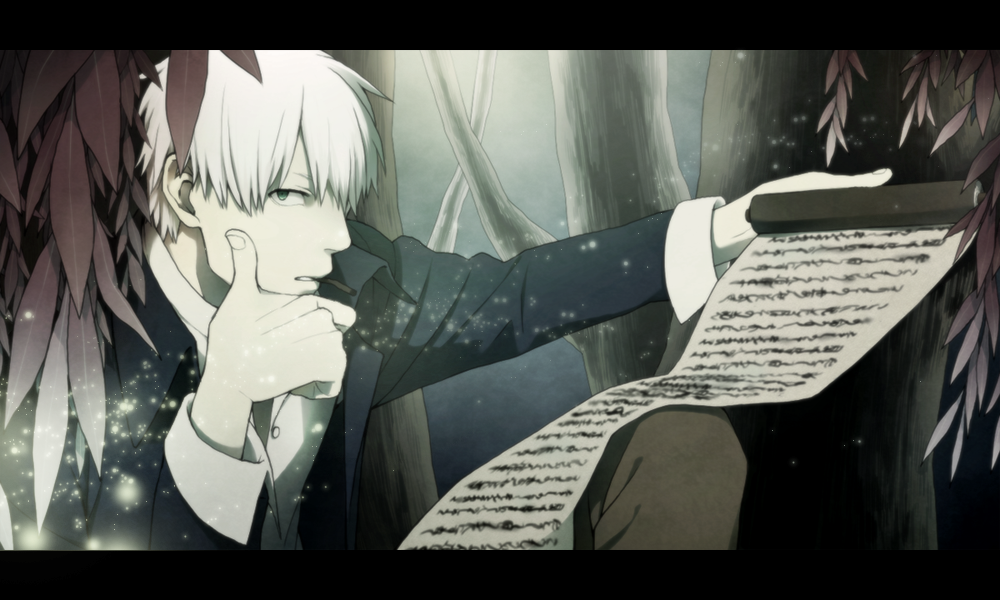How Do We Judge Anime?
Recently, my sister and I were talking about our favourite anime, and she said that she finds it difficult to separate her top three, Madoka Magica, Gurren Lagann, and Mushi-Shi. Now, ‘favourite’ is a subjective term, so there’s no need to try to be scientific about it, but this did get me thinking about how one would objectively judge between works that, though in the same medium, are so different from each other. Obviously, art will never be mathematically precise, but it is possible to make some judgements of quality. So, as a little exercise, I thought I’d consider these three.
 Typically, of course, one would begin by looking at technical skill. In this case, all three of these shows have detailed artwork and fluid animation, though as I recall, Mushi-Shi was the most stiff and Madoka the smoothest. Madoka also seemed to have the most detail and used the widest variety of animation techniques.
Typically, of course, one would begin by looking at technical skill. In this case, all three of these shows have detailed artwork and fluid animation, though as I recall, Mushi-Shi was the most stiff and Madoka the smoothest. Madoka also seemed to have the most detail and used the widest variety of animation techniques.
Here we run into a problem, though. Madoka benefited greatly by using different styles of animation, for example the paper-cutouts for battles with the witches. However, neither Gurren Lagann nor Mushi-Shi suffered for their relatively more conservative approach. For Mushi-Shi, especially, with a generally more sedate atmosphere, wildly divergent styles would likely only distract the viewer, and it actually benefits by presenting the supernatural mushi in the same style as the everyday. Subjectively, I prefer Shaft’s approach to Madoka, but objectively all three have a style that fits their themes and narrative.
What about themes? Gurren Lagann seems like a clear-cut coming-of-age story, about a boy trying to live up to his mentor. He does this by the end of the first season, and though the second season doesn’t really go beyond that and is thus probably unnecessary, the concept is simple but well-executed. On the other hand, Madoka takes a more complex approach, juggling a few subplots supporting a Faustian theme. Does the added complexity make Madoka superior? Though there’s certainly some merit to simplicity, as with, say, folk music, who would say that Woody Guthrie is therefore greater than Ludwig van Beethoven? Both series do what they set out to do, but I think it’s fair to give more credit to the more ambitious project.
Mushi-Shi, though, complicates things. As an episodic series, it does have its themes, but they’re developed across disparate narratives, and each narrative arc is necessarily short and fairly simple in itself. A single, longer arc allows more change in the protagonists and more subtletly in plotting, but in these particular cases neither Gurren Lagann nor Madoka have a lot of subtlety. I wouldn’t say that episodic series are ipso facto better or worse than series with a single narrative, so I suppose it’s just something to be considered on a case-by-case basis.
What about originality? Gurren Lagann and Madoka are original works, while Mushi-Shi is an adaptation from a graphic novel. There’s something to be said for originality, especially if we’re discussing historical significance. Now, I would follow Ezra Pound who, in a discussion of poetry, distinguished between ‘innovators’ and ‘masters’. They’re not the same, but a lot of credit should go to those who can do both. Though I do think a work should be judged primarily on its own merits, in a case like these three series we should note that Gurren Lagann and Madoka created something new (albeit within well-established genres), while Mushi-Shi merely translated an existing work.
So, where does this all leave us? All three excel, but Gurren Lagann’s undoubtedly entertaining but thematically mostly dead weight second season makes it the weakest. For the other two, since Mushi-Shi is a very straight adaptation, while Madoka is original work that also has a more visually interesting presentation, I’d make Madoka my first choice of this bunch.
Obviously, I didn’t go into a lot of detail, and maybe a closer analysis would’ve changed my mind on that. However, I mostly wanted to have a little intellectual exercise, as I find that I enjoy what I watch and read more the more I think about them.
Plus, if my sister comes to a different conclusion, I like being able to show her that she’s objectively wrong.